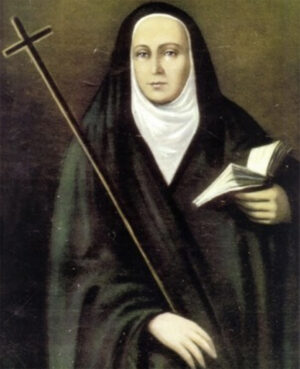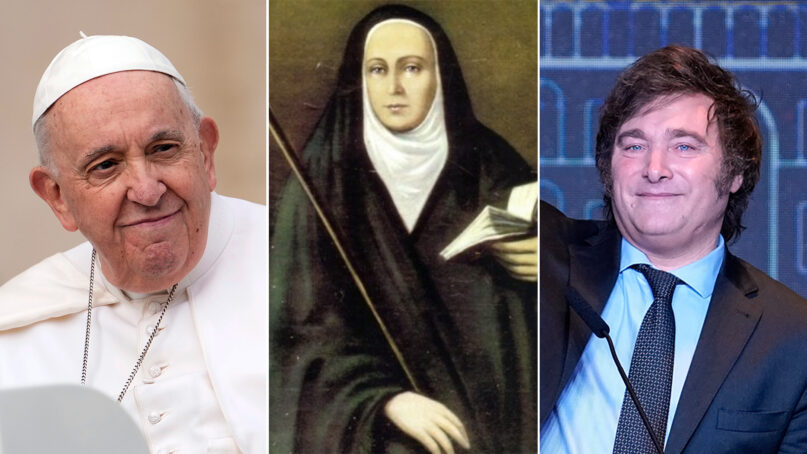VATICAN CITY (RNS) — Pope Francis will canonize a native of Argentina at a Mass in St. Peter’s Basilica on Sunday (Feb. 11), and the next day he will meet with the country’s recently elected right-wing president, Javier Milei, a sometime critic of the pope.
Blessed María Antonia de Paz y Figueroa, known for being a strong-willed woman who promoted her faith despite government hostility in the 1700s, will become Argentina’s first native-born saint.
“For Argentinians this is a very important day when we will finally have our first Argentinian saint,” said Bishop Jorge Ignacio García Cuerva of Buenos Aires, at a news conference at the Vatican on Thursday.
Milei, who during his run for president described the pope as an “imbecile” and “a filthy leftist,” attempted to bury the hatchet after his election, penning a letter inviting Francis to his native country of Argentina. The pope said in a December interview with Mexican broadcaster N+ that he didn’t take Milei’s colorful insults personally, stating that there must be a distinction between what politicians say during campaigns and what they do at the time of “concreteness, of decisions.”
The canonization offers the two men an opportunity for further reconciliation, while putting a spotlight on the Catholic — and Jesuit — history of Argentina.

Blessed María Antonia de Paz y Figueroa. (Image courtesy of Wikipedia/Creative Commons)
De Paz y Figueroa was born to a wealthy Argentine family in 1730 and displayed a deep spirituality early in her youth. At the age of 15 she dedicated her life to God under the spiritual direction of Jesuit priest Gaspar Juarez. When Charles III of Spain expelled the Jesuit order from the Spanish Empire in 1767, De Paz y Figueroa decided to continue evangelizing and practicing the Jesuit rule known as the Spiritual Exercises of St. Ignatius of Loyola.
She journeyed, wearing a black Jesuit-like habit, for miles through the Argentine territories, organizing spiritual retreats. Despite opposition, De Paz y Figueroa continued her work, thanks to the support of the bishop of the city of Santiago del Estero.
By 1780, her retreats had become increasingly popular and, according to those arguing for her sainthood, known as postulators, she was able to bring the Spiritual Exercises to more than 70,000 people. She eventually established the Daughters of the Divine Savior and became known as Mama Antula among the Indigenous Quechua population and beyond.
A biography titled “Mama Antula: The Faith of a Rebellious Woman,” written by Nunzia Locatelli and Cintia Suares and presented at the Vatican in December, described María Antonia De Paz y Figueroa as “the most rebellious woman of her time.” In her travels, she was able to perform spiritual exercises on those who would become the founding fathers of the nascent Argentine nation, including Manuel Belgrano and Miguel de Azcuénaga.
“She is very important for all Argentinian women for everything that she has done, not only for her religious habit, but also for the story of the birth of our homeland. We consider her the mother of our homeland,” said the postulator for her sainthood cause, Silvia Correale.
“Her canonization is very important right now,” she added, hinting at the political and economic challenges facing the country.
De Paz y Figueroa was proclaimed venerable in 2010 and was beatified in 2016 in Santiago del Estero after Pope Francis recognized the miraculous healing of Sister Maria Rosa Vermina of the Daughters of the Divine Savior.
A second miracle was attributed to the Argentine nun when a man who was suddenly reduced to a vegetative state was, her supporters say, healed through her intercession. Speaking at the Vatican news conference, Bishop Vicente Bokalic Iglic of Santiago del Estero referred to the canonization as “a gift from God.”
“The news of the canonization was experienced with profound joy and it was greatly anticipated by our church and by our people,” he said.





